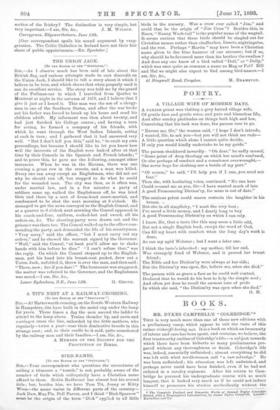THE UNION JACK.
[To TEE EDITOR Or Tint " SPECSLTOR."] SIR,—As I observe much has been said of late about the British flag, and various attempts made to cast discredit on the Union Jack, I should like to tell a story about it which I believe to be true, and which shows that when properly used it can do excellent service. The story was told me by the guard of the Pullman-car in which I travelled from Quebec to Montreal at night in the autumn of 1878, and I believe that I give it just as I heard it. This man was the son of a clergy- man in one of the Southern States, and after the war broke out his father was forced to break up his home and send his children adrift. My informant was then about twenty, and had just finished his College course ; and having a turn for acting, he formed a company of his friends, with which he went through the West Indian Islands, acting at each in turn ; and I gathered that it had answered very well. "But I don't tell you this," said he, "to exalt my own proceedings, but because I should like to let you know bow well the interests of the English were looked after at that time by their Consuls in the Spanish and French islands ; " and to prove this, he gave me the following, amongst other instances. When he was in the Havana, there was one evening a great row in the streets, and a man was killed. Every one ran away except an Englishman, who did not see why he should run off, but stopped to do what be could for the wounded man. The city was then, as it often was, under martial law, and in a few minutes a party of soldiers came up, walked the Englishman off, he was tried then and there by a sort of drum-head court-martial, and condemned to be shot the next morning at 8 o'clock. He managed to get the news conveyed to the English Consul, and at a quarter to 8 o'clock next morning the Consul appeared in his coach-and-four, uniform, cocked-bat and sword, all his orders on, &c. The shooting-party were drawn out, and the prisoner was there too. The Consul walked up to the officer com- manding the party, and demanded the life of his countryman. "Very sorry," said the officer, "but I must carry out my orders," and he showed the warrant signed by the Governor. "Well," said the Consul, " at least you'll allow me to shake hands with bim before he dies." "I can't refuse that," was the reply. On which the Consul stepped up to the English- man, put his hand into his breast-coat pocket, drew out a Union Jack, unfolded it, threw it over the man, and then said : " There, now; fire if you dare !" The lieutenant was staggered, the matter was referred to the Governor, and the Englishman was saved.—I am, Sir, &c., Lower Sydenhant, S.E., June 11th. G. GROVE.


































 Previous page
Previous page